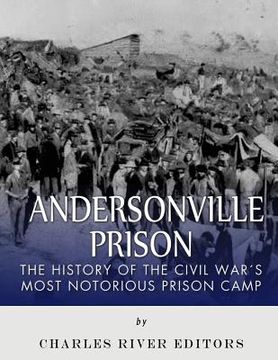Andersonville Prison: The History of the Civil War's Most Notorious Prison Camp (en Inglés)
Reseña del libro "Andersonville Prison: The History of the Civil War's Most Notorious Prison Camp (en Inglés)"
*Includes pictures *Includes accounts of the prison written by surviving prisoners *Includes footnotes and a bibliography for further reading *Includes a table of contents "Wuld that I was an artist & had the material to paint this camp & all its horors or the tounge of some eloquent Statesman and had the privleage of expresing my mind to our hon. rulers at Washington, I should gloery to describe this hell on earth where it takes 7 of its ocupiants to make a shadow." - Sgt. David Kennedy "There is so much filth about the camp that it is terrible trying to live here." - Michigan cavalryman John Ransom Notorious, a hell on earth, a cesspool, a death camp, and infamous have all been used by prisoners and critics to describe Andersonville Prison, constructed to house Union prisoners of war in 1864, and all descriptions apply. Located in Andersonville, Georgia and known colloquially as Camp Sumter, Andersonville only served as a prison camp for 14 months, but during that time 45,000 Union soldiers suffered there, and nearly 13,000 died. Victims found at the end of the war who had been held at Camp Sumter resembled victims of Auschwitz, starving and left to die with no regard for human life. Rumors about the horrors of Andersonville were making the rounds by the summer of 1864, and they were bad enough that during the Atlanta campaign, Union General William Tecumseh Sherman gave orders for a cavalry raid attempting to liberate the prisoners there. The Union cavalry were repulsed by Southern militia and cavalry at that point, and even after Sherman took Atlanta, the retreating Confederates moved under the assumption that the Union would target Andersonville yet again. Before the end of the war, the Confederates were moving prisoners from Andersonville to Camp Lawton, but by then, Andersonville was already synonymous with horror. Unable to supply its own armies, the Confederates had inadequately supplied the prison and its thousands of Union prisoners, leaving over 25% of the prisoners to die of starvation and disease. All told, Andersonville accounted for 40% of the deaths of all Union prisoners in the South, and the causes of death included malnutrition, disease, poor sanitation, overcrowding, and exposure to inclement weather. In fact, Andersonville infuriated the North so much that Henry Wirz, the man in charge of Andersonville, was the only Confederate executed after the war. Before the war, Wirz was a Swiss doctor who had practiced medicine in Kentucky, but while some Southern scholars continue to believe he was simply a victim of circumstance, plenty of evidence suggests his actions were far more insidious and deadly. As the debate over Wirz's fate suggests, one lingering argument in the analysis of Andersonville is whether the abuse and starvation of prisoners was a tragic circumstance of wartime conditions and poverty in the South or if the mistreatment was purposeful and intended. Most scholarship supports the latter point of view, and for the most part, the major dissenting views come from Southern writers and historians who espouse the "Lost Cause." There were articles of war and specific rules on how to treat prisoners on both sides, but by any measurement, humane treatment was all but nonexistent at Andersonville. Andersonville Prison: The History of the Civil War's Most Notorious Prison Camp chronicles the history of the Civil War's most infamous prison. Along with pictures of important people, places, and events, you will learn about Andersonville like never before, in no time at all.

